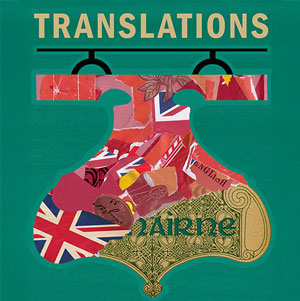
 Recommended *** It takes over an hour for the phrase “Make Rome great again” to appear in the new production of Julius Caesar at Writers Theatre. But it is built up to so with such strong support from co-directors Michael Halberstam and Scott Parkinson’s streamlining of William Shakespeare’s text that, rather than seeming forced or gimmicky, the comparison is so obvious that if the production had not stated it explicitly, it would have been conspicuous by its absence. During the year commemorating the four hundredth anniversary of Shakespeare’s death, Chicago-area audiences have seen a wide variety of demonstrations of the great poet-playwright’s immortal genius and continuing relevance. The modernity of his representation of the Roman Republic’s downfall was chilling when Orson Welles adapted it in 1937, and with a brilliant team of actors and designers assisting the directors’ vision at Writers, it is a disquieting masterpiece today.
Recommended *** It takes over an hour for the phrase “Make Rome great again” to appear in the new production of Julius Caesar at Writers Theatre. But it is built up to so with such strong support from co-directors Michael Halberstam and Scott Parkinson’s streamlining of William Shakespeare’s text that, rather than seeming forced or gimmicky, the comparison is so obvious that if the production had not stated it explicitly, it would have been conspicuous by its absence. During the year commemorating the four hundredth anniversary of Shakespeare’s death, Chicago-area audiences have seen a wide variety of demonstrations of the great poet-playwright’s immortal genius and continuing relevance. The modernity of his representation of the Roman Republic’s downfall was chilling when Orson Welles adapted it in 1937, and with a brilliant team of actors and designers assisting the directors’ vision at Writers, it is a disquieting masterpiece today.
Early in the modern-dress play, Caesar’s proletarian partisans chant his name and wear the abbreviation of Rome’s motto, SPQR, as a mere nationalistic logo—they don’t really have any respect for the senate represented by the S. However, it is easy to sympathize with their discontent. Before any of the great historical figures appear to begin their politicking, an aristocrat and supporter of the late general Pompey pulls a gun on a cobbler with very little provocation and no justification, in what is apparently a typical interaction between the entrenched powers and the common people. Conquering general and dictator-for-life Julius Caesar (Madrid St. Angelo) appears to be a savior due to his willingness to openly insult and disdain the hated aristocrats, and the people unthinkingly adore him for it. Those few who still believe in the Republic are far less pleased by Caesar’s grip on power.
Among those concerned for the cause of liberty is Caesar’s former ally, Brutus (Kareem Bandealy). Bandealy expresses his feelings with great sensitivity, for Brutus’s defining characteristic is that his rigid and intellectual morality gives him some ability to command a crowd, but he is routinely outshone by the passion and bravado of Cassius and Mark Antony. Cassius is being played by Parkinson, but although he is the main adaptor of the script, Parkinson made the relationship between Cassius and Brutus much more equitable than it is commonly interpreted. When Cassius complains to Brutus of Caesar’s abuses, he does not seem manipulative, but like a confused and desperate man who has come to a peer for support. Cassius himself does not initially appear to be resolved to kill Caesar, and other than a raspy voice which might possibly suggest bad habits or a tendency to throw tantrums when not in the presence of people he respects, there is initially little reason to think that Cassius has any particularly unseemly traits. But when the unfathomably pompous and arrogant Caesar turns his vitriol on Cassius, the volatile senator’s pride is pushed past its endurance just as the cerebral Brutus is nearly convinced that Caesar has become an existential menace.
The play is one of Shakespeare’s shortest, and the cuts to the text make it shorter still, but the pace of the direction allows most moments prior to Mark Antony’s famous oration at Caesar’s funeral to develop fully. (The scenes in the last quarter of the play are confusing and poorly motivated, which is what prevents the production from receiving a perfect rating.) But while our time in the theatre is brief, Halberstam’s design team has made the slow-rolling apocalypse Rome has experienced over the past several decades visually apparent. Costume designer Mara Blumenfeld cleverly updated the togas into black knee-length formal coats with hoods, resulting in a versatile and evocative garment perfect for both shadowy conspiracies and displays of high status. Scenic designer Courtney O’Neill has scattered the stage with megaliths which, with a projected texture, can become Roman columns, but alone are something even more ancient and timeless.
The most prominently featured design element are the projections by Mike Tutaj, which depict scenes of natural disasters and the online activities of the Roman mob. In the scene of Caesar’s funeral orations, we witness exactly how emotional appeals and group-think sway public opinion in contemporary politics, as first Brutus, and then Mark Antony rally the people to their contrary causes. The real Brutus was the nephew of the famously and futilely stoic Cato the Younger, which heavily influenced Shakespeare and Bandealy’s depiction of him. There’s something appealing about his devotion to principle, but he’s no match for the fire of Thomas Vincent Kelly’s Mark Antony. Lacking any trace of the self-pitying romantic drunk he was to become, this Antony is at the height of his powers. His speech is hypnotic and awe-inspiring. Along with Octavius (Sydney Germaine), he is a living embodiment of cruelty, in stark contrast with the charm and self-effacement he displayed while happily working for Caesar. It seems that he is genuinely motivated by vengeance, and not just political ambition (like Octavius).
Political theatre in Chicago suffers somewhat from the single-party nature of the city, but Glencoe is in the middle of a congressional battleground. Alarming as the content of Julius Caesar is right before the election, it is a pleasure to see such a fine company taking on contemporary issues directly. Rome in 44 BC had already been through several civil wars and dictators, and the reality Brutus forced himself to ignore was that the Republic probably could not have been restored by then no matter what happened on the Ides of March or at the Battle of Philippi. Halberstam and Parkinson emphasize that the moral situation of the play is complicated and provides the characters with no feasible solutions, though their opinion that the ballot this November will present us with a much easier choice is unmistakable. Interestingly, Caesar rose to power not only as a populist general, but as the ally of the infamous real estate tycoon Marcus Licinius Crassus. As the lights came up opening night to a repetition of Cassius’s line that “That part of tyranny that I do bear I can shake off at pleasure,” we were reminded of how much power each of us really has.
“Julius Caesar” will continue at Writers Theatre, located at 325 Tudor Court, Glencoe, Illinois, thru October 16. Running time is 105 minutes with no intermission, with performances as follows:
 Tuesdays-Fridays at 7:30 p.m. (with 3:00 p.m. Wednesday matinees on September 21 and 28)
Tuesdays-Fridays at 7:30 p.m. (with 3:00 p.m. Wednesday matinees on September 21 and 28)
Saturdays at 3:00 p.m. and 7:30 p.m.
Sundays at 2:00 p.m. and 6:00 p.m. (except September 25 and October 2)
Tickets range from $35-80 and may be purchased at the box office or by calling 847-242-6000 or visiting writerstheatre.org.
Street parking is available.
To see what others are saying, go to TheatreinChicago.com, go to review round-up, and click “Julius Caesar.”






More Stories
“Translations”
“The Firebugs” reviewed by Julia W. Rath
“The Book of Grace” Al Bresloff with another from Paul LIsnek